Foundations of Business Communication: CSR Strategies and Approaches
VerifiedAdded on 2023/01/06
|14
|4351
|61
Report
AI Summary
This report provides a comprehensive overview of Corporate Social Responsibility (CSR) and sustainable business practices. It begins by explaining the importance of sustainability in business strategy and management, emphasizing the three pillars of sustainability: environmental, economic, and socio-cultural. The report then delves into various CSR approaches, including philanthropic, community, and shared value approaches, and how these are applied by micro, SME, and corporate businesses. It highlights the benefits of CSR, such as attracting and retaining a skilled workforce and building a positive brand image. Furthermore, the report discusses how the success of CSR strategies is measured, outlining different criteria for micro, SME, and corporate entities, such as comparing outcomes with set goals, analyzing growth and development, and assessing brand value and reputation. The report concludes by examining the challenges and dimensions of CSR, emphasizing the need for transparency and stakeholder engagement. Examples from companies like IKEA, Google, and Coca-Cola are used to illustrate practical applications of CSR initiatives.

Foundations of Business
Communication
1
Communication
1
Paraphrase This Document
Need a fresh take? Get an instant paraphrase of this document with our AI Paraphraser
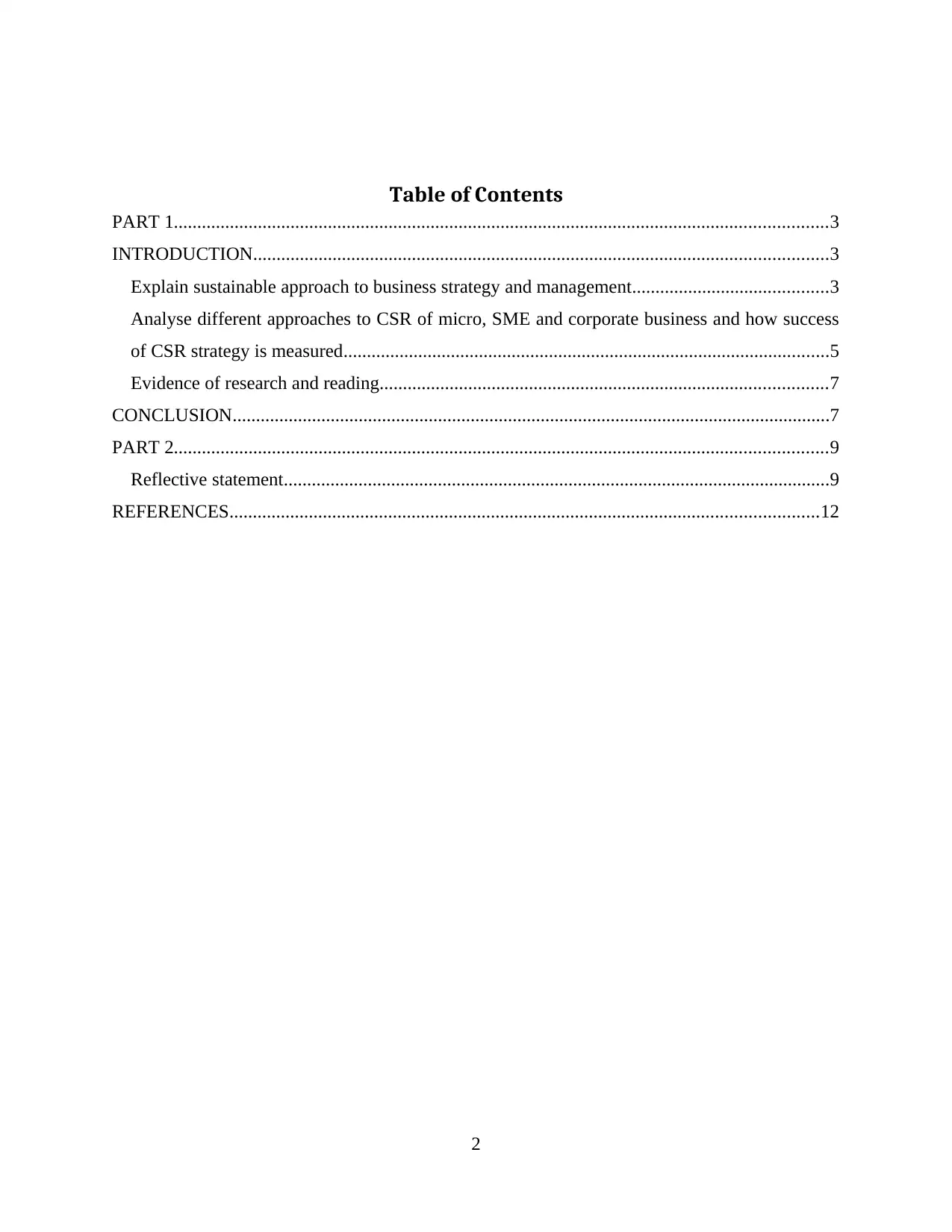
Table of Contents
PART 1............................................................................................................................................3
INTRODUCTION...........................................................................................................................3
Explain sustainable approach to business strategy and management..........................................3
Analyse different approaches to CSR of micro, SME and corporate business and how success
of CSR strategy is measured........................................................................................................5
Evidence of research and reading................................................................................................7
CONCLUSION................................................................................................................................7
PART 2............................................................................................................................................9
Reflective statement.....................................................................................................................9
REFERENCES..............................................................................................................................12
2
PART 1............................................................................................................................................3
INTRODUCTION...........................................................................................................................3
Explain sustainable approach to business strategy and management..........................................3
Analyse different approaches to CSR of micro, SME and corporate business and how success
of CSR strategy is measured........................................................................................................5
Evidence of research and reading................................................................................................7
CONCLUSION................................................................................................................................7
PART 2............................................................................................................................................9
Reflective statement.....................................................................................................................9
REFERENCES..............................................................................................................................12
2
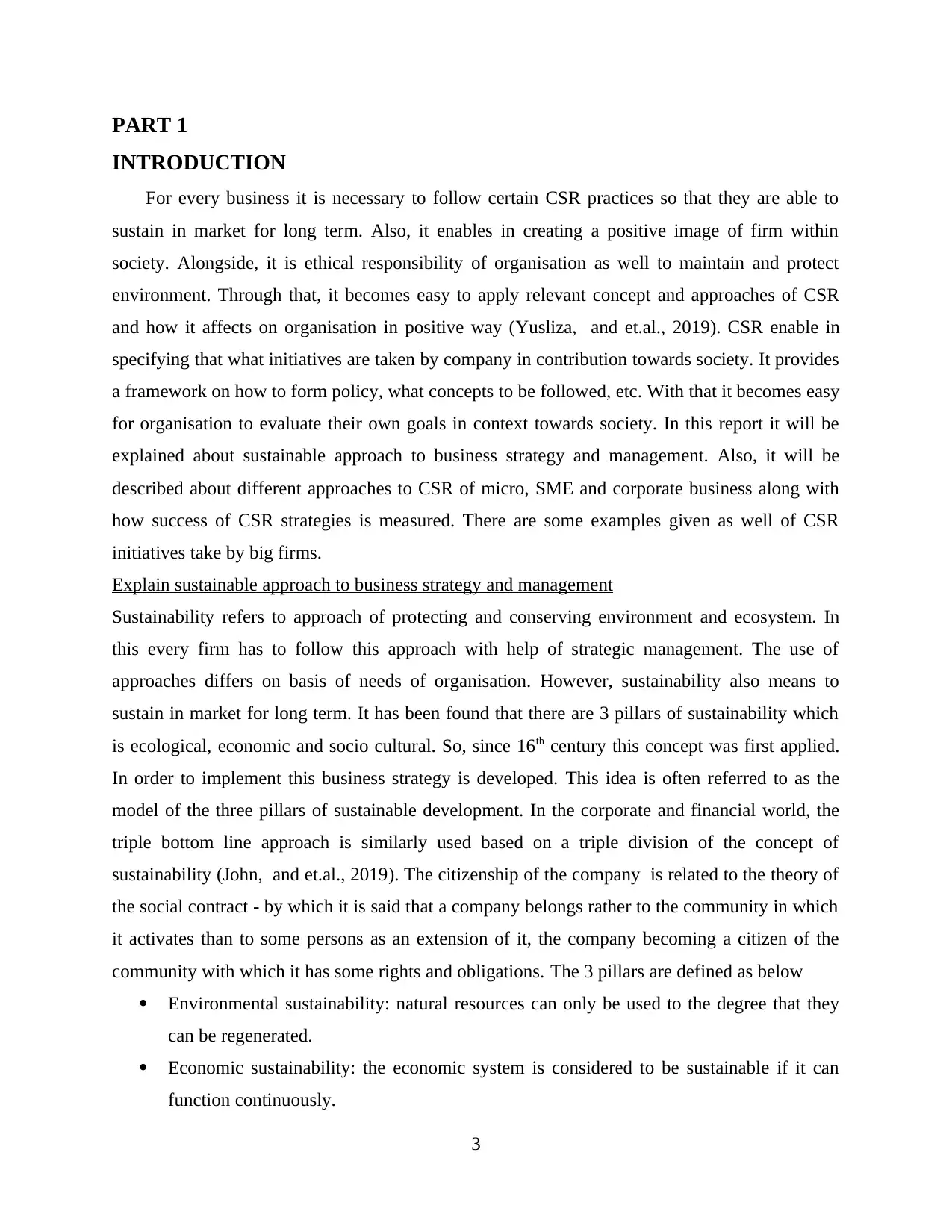
PART 1
INTRODUCTION
For every business it is necessary to follow certain CSR practices so that they are able to
sustain in market for long term. Also, it enables in creating a positive image of firm within
society. Alongside, it is ethical responsibility of organisation as well to maintain and protect
environment. Through that, it becomes easy to apply relevant concept and approaches of CSR
and how it affects on organisation in positive way (Yusliza, and et.al., 2019). CSR enable in
specifying that what initiatives are taken by company in contribution towards society. It provides
a framework on how to form policy, what concepts to be followed, etc. With that it becomes easy
for organisation to evaluate their own goals in context towards society. In this report it will be
explained about sustainable approach to business strategy and management. Also, it will be
described about different approaches to CSR of micro, SME and corporate business along with
how success of CSR strategies is measured. There are some examples given as well of CSR
initiatives take by big firms.
Explain sustainable approach to business strategy and management
Sustainability refers to approach of protecting and conserving environment and ecosystem. In
this every firm has to follow this approach with help of strategic management. The use of
approaches differs on basis of needs of organisation. However, sustainability also means to
sustain in market for long term. It has been found that there are 3 pillars of sustainability which
is ecological, economic and socio cultural. So, since 16th century this concept was first applied.
In order to implement this business strategy is developed. This idea is often referred to as the
model of the three pillars of sustainable development. In the corporate and financial world, the
triple bottom line approach is similarly used based on a triple division of the concept of
sustainability (John, and et.al., 2019). The citizenship of the company is related to the theory of
the social contract - by which it is said that a company belongs rather to the community in which
it activates than to some persons as an extension of it, the company becoming a citizen of the
community with which it has some rights and obligations. The 3 pillars are defined as below
Environmental sustainability: natural resources can only be used to the degree that they
can be regenerated.
Economic sustainability: the economic system is considered to be sustainable if it can
function continuously.
3
INTRODUCTION
For every business it is necessary to follow certain CSR practices so that they are able to
sustain in market for long term. Also, it enables in creating a positive image of firm within
society. Alongside, it is ethical responsibility of organisation as well to maintain and protect
environment. Through that, it becomes easy to apply relevant concept and approaches of CSR
and how it affects on organisation in positive way (Yusliza, and et.al., 2019). CSR enable in
specifying that what initiatives are taken by company in contribution towards society. It provides
a framework on how to form policy, what concepts to be followed, etc. With that it becomes easy
for organisation to evaluate their own goals in context towards society. In this report it will be
explained about sustainable approach to business strategy and management. Also, it will be
described about different approaches to CSR of micro, SME and corporate business along with
how success of CSR strategies is measured. There are some examples given as well of CSR
initiatives take by big firms.
Explain sustainable approach to business strategy and management
Sustainability refers to approach of protecting and conserving environment and ecosystem. In
this every firm has to follow this approach with help of strategic management. The use of
approaches differs on basis of needs of organisation. However, sustainability also means to
sustain in market for long term. It has been found that there are 3 pillars of sustainability which
is ecological, economic and socio cultural. So, since 16th century this concept was first applied.
In order to implement this business strategy is developed. This idea is often referred to as the
model of the three pillars of sustainable development. In the corporate and financial world, the
triple bottom line approach is similarly used based on a triple division of the concept of
sustainability (John, and et.al., 2019). The citizenship of the company is related to the theory of
the social contract - by which it is said that a company belongs rather to the community in which
it activates than to some persons as an extension of it, the company becoming a citizen of the
community with which it has some rights and obligations. The 3 pillars are defined as below
Environmental sustainability: natural resources can only be used to the degree that they
can be regenerated.
Economic sustainability: the economic system is considered to be sustainable if it can
function continuously.
3
⊘ This is a preview!⊘
Do you want full access?
Subscribe today to unlock all pages.

Trusted by 1+ million students worldwide
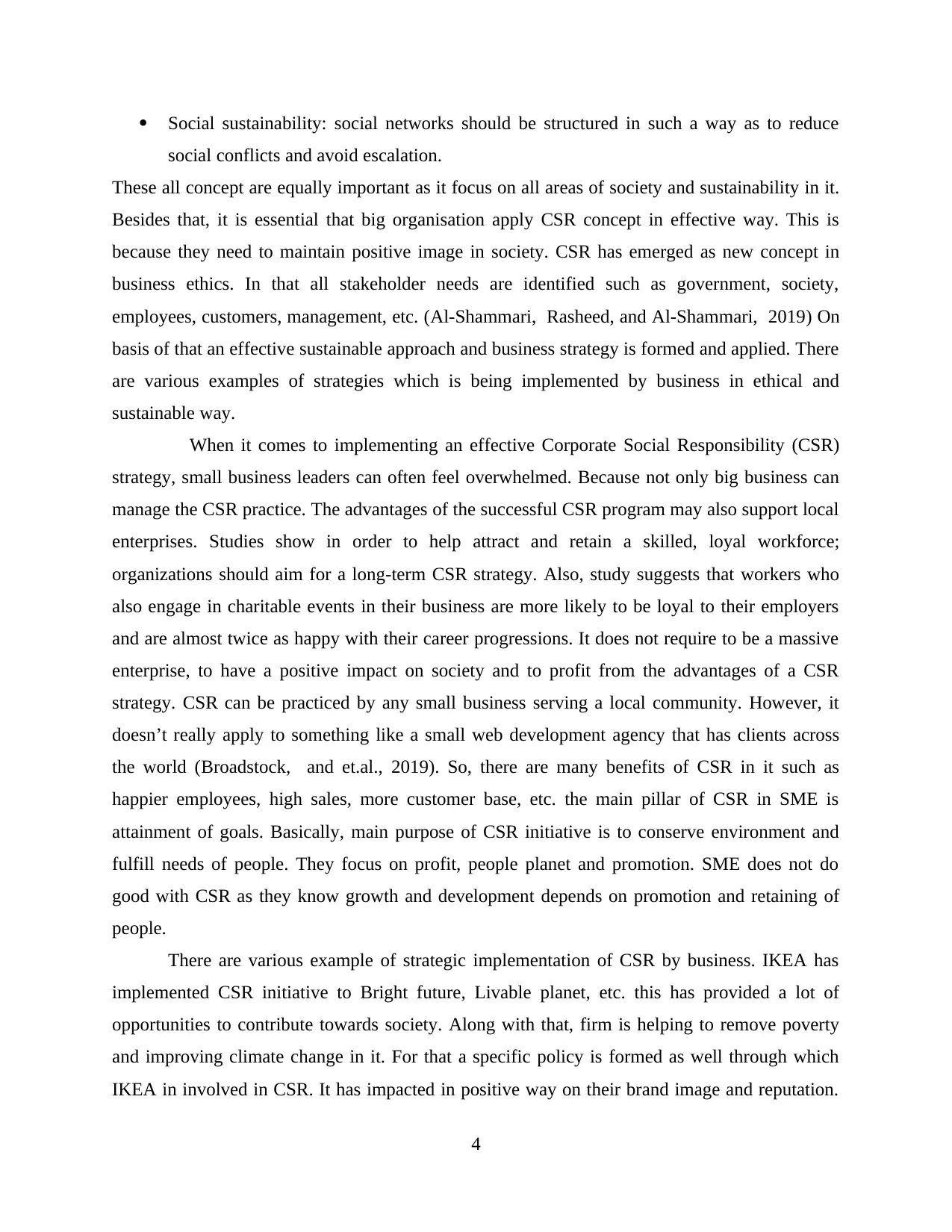
Social sustainability: social networks should be structured in such a way as to reduce
social conflicts and avoid escalation.
These all concept are equally important as it focus on all areas of society and sustainability in it.
Besides that, it is essential that big organisation apply CSR concept in effective way. This is
because they need to maintain positive image in society. CSR has emerged as new concept in
business ethics. In that all stakeholder needs are identified such as government, society,
employees, customers, management, etc. (Al-Shammari, Rasheed, and Al-Shammari, 2019) On
basis of that an effective sustainable approach and business strategy is formed and applied. There
are various examples of strategies which is being implemented by business in ethical and
sustainable way.
When it comes to implementing an effective Corporate Social Responsibility (CSR)
strategy, small business leaders can often feel overwhelmed. Because not only big business can
manage the CSR practice. The advantages of the successful CSR program may also support local
enterprises. Studies show in order to help attract and retain a skilled, loyal workforce;
organizations should aim for a long-term CSR strategy. Also, study suggests that workers who
also engage in charitable events in their business are more likely to be loyal to their employers
and are almost twice as happy with their career progressions. It does not require to be a massive
enterprise, to have a positive impact on society and to profit from the advantages of a CSR
strategy. CSR can be practiced by any small business serving a local community. However, it
doesn’t really apply to something like a small web development agency that has clients across
the world (Broadstock, and et.al., 2019). So, there are many benefits of CSR in it such as
happier employees, high sales, more customer base, etc. the main pillar of CSR in SME is
attainment of goals. Basically, main purpose of CSR initiative is to conserve environment and
fulfill needs of people. They focus on profit, people planet and promotion. SME does not do
good with CSR as they know growth and development depends on promotion and retaining of
people.
There are various example of strategic implementation of CSR by business. IKEA has
implemented CSR initiative to Bright future, Livable planet, etc. this has provided a lot of
opportunities to contribute towards society. Along with that, firm is helping to remove poverty
and improving climate change in it. For that a specific policy is formed as well through which
IKEA in involved in CSR. It has impacted in positive way on their brand image and reputation.
4
social conflicts and avoid escalation.
These all concept are equally important as it focus on all areas of society and sustainability in it.
Besides that, it is essential that big organisation apply CSR concept in effective way. This is
because they need to maintain positive image in society. CSR has emerged as new concept in
business ethics. In that all stakeholder needs are identified such as government, society,
employees, customers, management, etc. (Al-Shammari, Rasheed, and Al-Shammari, 2019) On
basis of that an effective sustainable approach and business strategy is formed and applied. There
are various examples of strategies which is being implemented by business in ethical and
sustainable way.
When it comes to implementing an effective Corporate Social Responsibility (CSR)
strategy, small business leaders can often feel overwhelmed. Because not only big business can
manage the CSR practice. The advantages of the successful CSR program may also support local
enterprises. Studies show in order to help attract and retain a skilled, loyal workforce;
organizations should aim for a long-term CSR strategy. Also, study suggests that workers who
also engage in charitable events in their business are more likely to be loyal to their employers
and are almost twice as happy with their career progressions. It does not require to be a massive
enterprise, to have a positive impact on society and to profit from the advantages of a CSR
strategy. CSR can be practiced by any small business serving a local community. However, it
doesn’t really apply to something like a small web development agency that has clients across
the world (Broadstock, and et.al., 2019). So, there are many benefits of CSR in it such as
happier employees, high sales, more customer base, etc. the main pillar of CSR in SME is
attainment of goals. Basically, main purpose of CSR initiative is to conserve environment and
fulfill needs of people. They focus on profit, people planet and promotion. SME does not do
good with CSR as they know growth and development depends on promotion and retaining of
people.
There are various example of strategic implementation of CSR by business. IKEA has
implemented CSR initiative to Bright future, Livable planet, etc. this has provided a lot of
opportunities to contribute towards society. Along with that, firm is helping to remove poverty
and improving climate change in it. For that a specific policy is formed as well through which
IKEA in involved in CSR. It has impacted in positive way on their brand image and reputation.
4
Paraphrase This Document
Need a fresh take? Get an instant paraphrase of this document with our AI Paraphraser
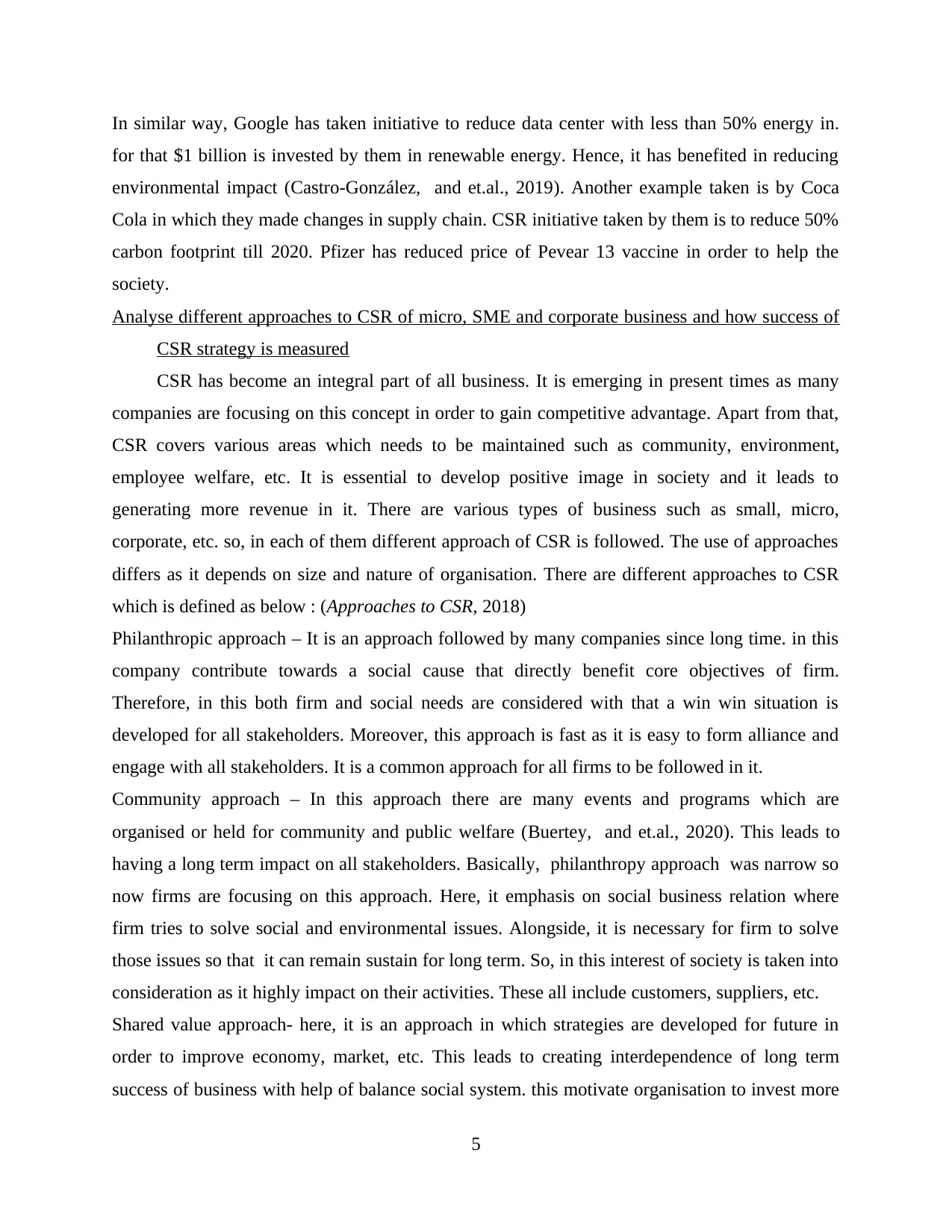
In similar way, Google has taken initiative to reduce data center with less than 50% energy in.
for that $1 billion is invested by them in renewable energy. Hence, it has benefited in reducing
environmental impact (Castro-González, and et.al., 2019). Another example taken is by Coca
Cola in which they made changes in supply chain. CSR initiative taken by them is to reduce 50%
carbon footprint till 2020. Pfizer has reduced price of Pevear 13 vaccine in order to help the
society.
Analyse different approaches to CSR of micro, SME and corporate business and how success of
CSR strategy is measured
CSR has become an integral part of all business. It is emerging in present times as many
companies are focusing on this concept in order to gain competitive advantage. Apart from that,
CSR covers various areas which needs to be maintained such as community, environment,
employee welfare, etc. It is essential to develop positive image in society and it leads to
generating more revenue in it. There are various types of business such as small, micro,
corporate, etc. so, in each of them different approach of CSR is followed. The use of approaches
differs as it depends on size and nature of organisation. There are different approaches to CSR
which is defined as below : (Approaches to CSR, 2018)
Philanthropic approach – It is an approach followed by many companies since long time. in this
company contribute towards a social cause that directly benefit core objectives of firm.
Therefore, in this both firm and social needs are considered with that a win win situation is
developed for all stakeholders. Moreover, this approach is fast as it is easy to form alliance and
engage with all stakeholders. It is a common approach for all firms to be followed in it.
Community approach – In this approach there are many events and programs which are
organised or held for community and public welfare (Buertey, and et.al., 2020). This leads to
having a long term impact on all stakeholders. Basically, philanthropy approach was narrow so
now firms are focusing on this approach. Here, it emphasis on social business relation where
firm tries to solve social and environmental issues. Alongside, it is necessary for firm to solve
those issues so that it can remain sustain for long term. So, in this interest of society is taken into
consideration as it highly impact on their activities. These all include customers, suppliers, etc.
Shared value approach- here, it is an approach in which strategies are developed for future in
order to improve economy, market, etc. This leads to creating interdependence of long term
success of business with help of balance social system. this motivate organisation to invest more
5
for that $1 billion is invested by them in renewable energy. Hence, it has benefited in reducing
environmental impact (Castro-González, and et.al., 2019). Another example taken is by Coca
Cola in which they made changes in supply chain. CSR initiative taken by them is to reduce 50%
carbon footprint till 2020. Pfizer has reduced price of Pevear 13 vaccine in order to help the
society.
Analyse different approaches to CSR of micro, SME and corporate business and how success of
CSR strategy is measured
CSR has become an integral part of all business. It is emerging in present times as many
companies are focusing on this concept in order to gain competitive advantage. Apart from that,
CSR covers various areas which needs to be maintained such as community, environment,
employee welfare, etc. It is essential to develop positive image in society and it leads to
generating more revenue in it. There are various types of business such as small, micro,
corporate, etc. so, in each of them different approach of CSR is followed. The use of approaches
differs as it depends on size and nature of organisation. There are different approaches to CSR
which is defined as below : (Approaches to CSR, 2018)
Philanthropic approach – It is an approach followed by many companies since long time. in this
company contribute towards a social cause that directly benefit core objectives of firm.
Therefore, in this both firm and social needs are considered with that a win win situation is
developed for all stakeholders. Moreover, this approach is fast as it is easy to form alliance and
engage with all stakeholders. It is a common approach for all firms to be followed in it.
Community approach – In this approach there are many events and programs which are
organised or held for community and public welfare (Buertey, and et.al., 2020). This leads to
having a long term impact on all stakeholders. Basically, philanthropy approach was narrow so
now firms are focusing on this approach. Here, it emphasis on social business relation where
firm tries to solve social and environmental issues. Alongside, it is necessary for firm to solve
those issues so that it can remain sustain for long term. So, in this interest of society is taken into
consideration as it highly impact on their activities. These all include customers, suppliers, etc.
Shared value approach- here, it is an approach in which strategies are developed for future in
order to improve economy, market, etc. This leads to creating interdependence of long term
success of business with help of balance social system. this motivate organisation to invest more
5
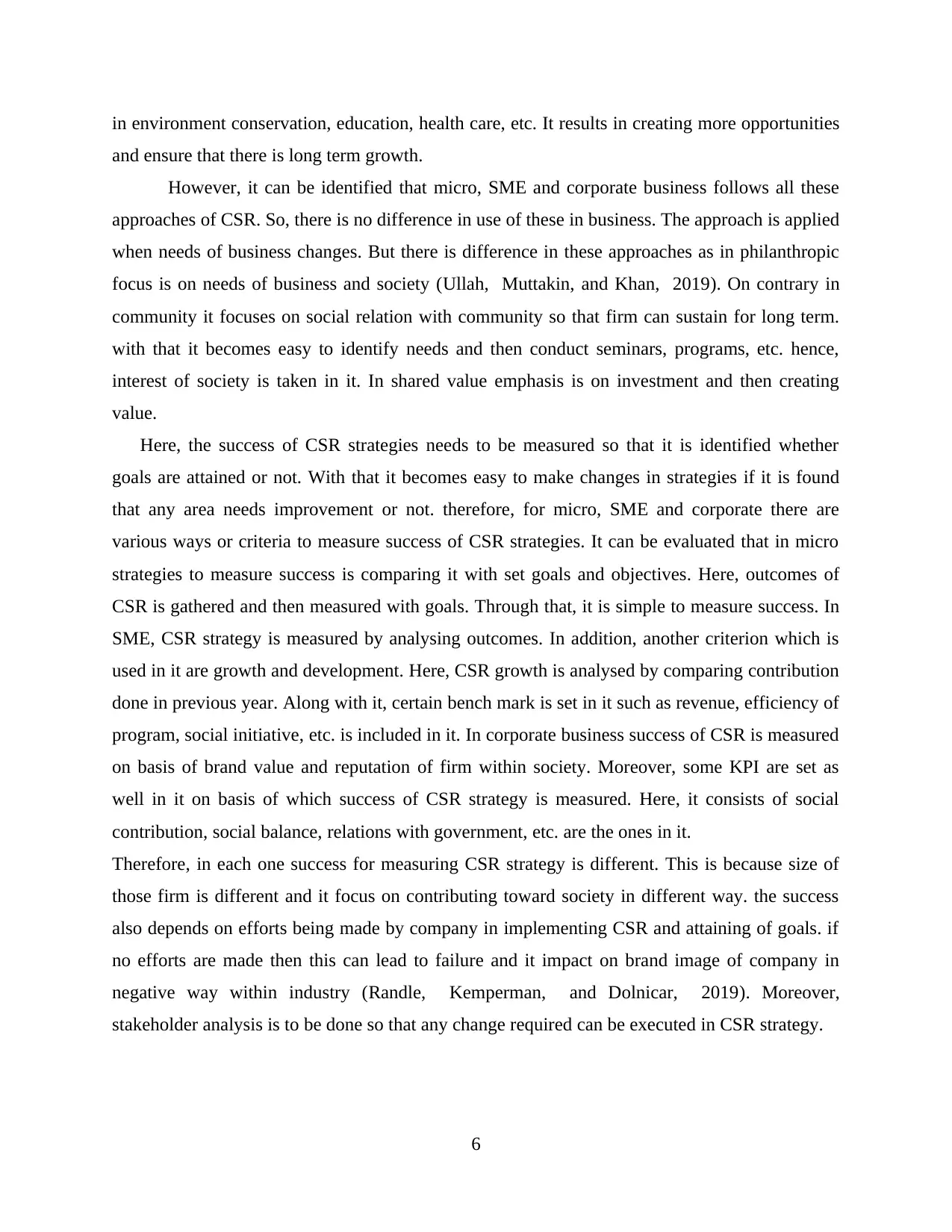
in environment conservation, education, health care, etc. It results in creating more opportunities
and ensure that there is long term growth.
However, it can be identified that micro, SME and corporate business follows all these
approaches of CSR. So, there is no difference in use of these in business. The approach is applied
when needs of business changes. But there is difference in these approaches as in philanthropic
focus is on needs of business and society (Ullah, Muttakin, and Khan, 2019). On contrary in
community it focuses on social relation with community so that firm can sustain for long term.
with that it becomes easy to identify needs and then conduct seminars, programs, etc. hence,
interest of society is taken in it. In shared value emphasis is on investment and then creating
value.
Here, the success of CSR strategies needs to be measured so that it is identified whether
goals are attained or not. With that it becomes easy to make changes in strategies if it is found
that any area needs improvement or not. therefore, for micro, SME and corporate there are
various ways or criteria to measure success of CSR strategies. It can be evaluated that in micro
strategies to measure success is comparing it with set goals and objectives. Here, outcomes of
CSR is gathered and then measured with goals. Through that, it is simple to measure success. In
SME, CSR strategy is measured by analysing outcomes. In addition, another criterion which is
used in it are growth and development. Here, CSR growth is analysed by comparing contribution
done in previous year. Along with it, certain bench mark is set in it such as revenue, efficiency of
program, social initiative, etc. is included in it. In corporate business success of CSR is measured
on basis of brand value and reputation of firm within society. Moreover, some KPI are set as
well in it on basis of which success of CSR strategy is measured. Here, it consists of social
contribution, social balance, relations with government, etc. are the ones in it.
Therefore, in each one success for measuring CSR strategy is different. This is because size of
those firm is different and it focus on contributing toward society in different way. the success
also depends on efforts being made by company in implementing CSR and attaining of goals. if
no efforts are made then this can lead to failure and it impact on brand image of company in
negative way within industry (Randle, Kemperman, and Dolnicar, 2019). Moreover,
stakeholder analysis is to be done so that any change required can be executed in CSR strategy.
6
and ensure that there is long term growth.
However, it can be identified that micro, SME and corporate business follows all these
approaches of CSR. So, there is no difference in use of these in business. The approach is applied
when needs of business changes. But there is difference in these approaches as in philanthropic
focus is on needs of business and society (Ullah, Muttakin, and Khan, 2019). On contrary in
community it focuses on social relation with community so that firm can sustain for long term.
with that it becomes easy to identify needs and then conduct seminars, programs, etc. hence,
interest of society is taken in it. In shared value emphasis is on investment and then creating
value.
Here, the success of CSR strategies needs to be measured so that it is identified whether
goals are attained or not. With that it becomes easy to make changes in strategies if it is found
that any area needs improvement or not. therefore, for micro, SME and corporate there are
various ways or criteria to measure success of CSR strategies. It can be evaluated that in micro
strategies to measure success is comparing it with set goals and objectives. Here, outcomes of
CSR is gathered and then measured with goals. Through that, it is simple to measure success. In
SME, CSR strategy is measured by analysing outcomes. In addition, another criterion which is
used in it are growth and development. Here, CSR growth is analysed by comparing contribution
done in previous year. Along with it, certain bench mark is set in it such as revenue, efficiency of
program, social initiative, etc. is included in it. In corporate business success of CSR is measured
on basis of brand value and reputation of firm within society. Moreover, some KPI are set as
well in it on basis of which success of CSR strategy is measured. Here, it consists of social
contribution, social balance, relations with government, etc. are the ones in it.
Therefore, in each one success for measuring CSR strategy is different. This is because size of
those firm is different and it focus on contributing toward society in different way. the success
also depends on efforts being made by company in implementing CSR and attaining of goals. if
no efforts are made then this can lead to failure and it impact on brand image of company in
negative way within industry (Randle, Kemperman, and Dolnicar, 2019). Moreover,
stakeholder analysis is to be done so that any change required can be executed in CSR strategy.
6
⊘ This is a preview!⊘
Do you want full access?
Subscribe today to unlock all pages.

Trusted by 1+ million students worldwide
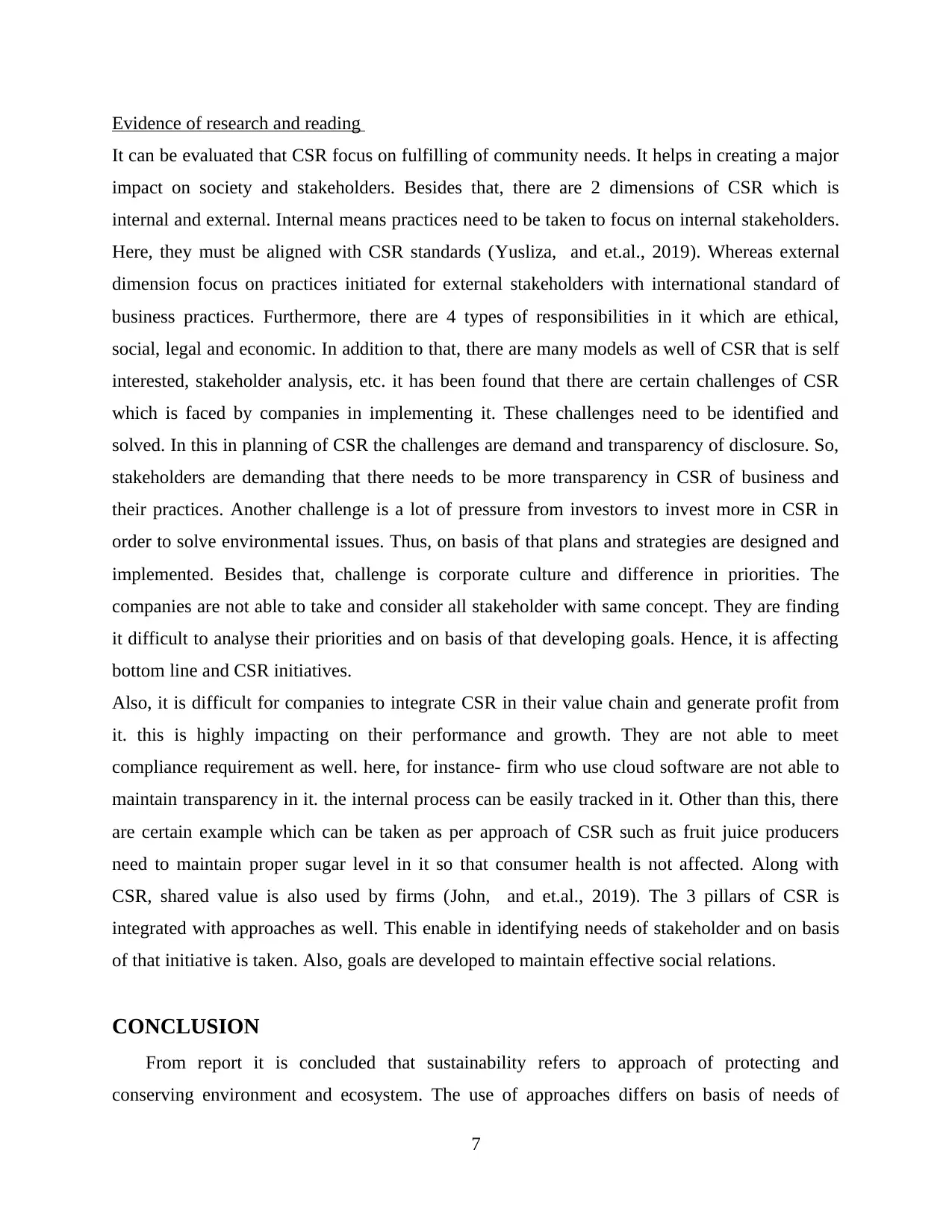
Evidence of research and reading
It can be evaluated that CSR focus on fulfilling of community needs. It helps in creating a major
impact on society and stakeholders. Besides that, there are 2 dimensions of CSR which is
internal and external. Internal means practices need to be taken to focus on internal stakeholders.
Here, they must be aligned with CSR standards (Yusliza, and et.al., 2019). Whereas external
dimension focus on practices initiated for external stakeholders with international standard of
business practices. Furthermore, there are 4 types of responsibilities in it which are ethical,
social, legal and economic. In addition to that, there are many models as well of CSR that is self
interested, stakeholder analysis, etc. it has been found that there are certain challenges of CSR
which is faced by companies in implementing it. These challenges need to be identified and
solved. In this in planning of CSR the challenges are demand and transparency of disclosure. So,
stakeholders are demanding that there needs to be more transparency in CSR of business and
their practices. Another challenge is a lot of pressure from investors to invest more in CSR in
order to solve environmental issues. Thus, on basis of that plans and strategies are designed and
implemented. Besides that, challenge is corporate culture and difference in priorities. The
companies are not able to take and consider all stakeholder with same concept. They are finding
it difficult to analyse their priorities and on basis of that developing goals. Hence, it is affecting
bottom line and CSR initiatives.
Also, it is difficult for companies to integrate CSR in their value chain and generate profit from
it. this is highly impacting on their performance and growth. They are not able to meet
compliance requirement as well. here, for instance- firm who use cloud software are not able to
maintain transparency in it. the internal process can be easily tracked in it. Other than this, there
are certain example which can be taken as per approach of CSR such as fruit juice producers
need to maintain proper sugar level in it so that consumer health is not affected. Along with
CSR, shared value is also used by firms (John, and et.al., 2019). The 3 pillars of CSR is
integrated with approaches as well. This enable in identifying needs of stakeholder and on basis
of that initiative is taken. Also, goals are developed to maintain effective social relations.
CONCLUSION
From report it is concluded that sustainability refers to approach of protecting and
conserving environment and ecosystem. The use of approaches differs on basis of needs of
7
It can be evaluated that CSR focus on fulfilling of community needs. It helps in creating a major
impact on society and stakeholders. Besides that, there are 2 dimensions of CSR which is
internal and external. Internal means practices need to be taken to focus on internal stakeholders.
Here, they must be aligned with CSR standards (Yusliza, and et.al., 2019). Whereas external
dimension focus on practices initiated for external stakeholders with international standard of
business practices. Furthermore, there are 4 types of responsibilities in it which are ethical,
social, legal and economic. In addition to that, there are many models as well of CSR that is self
interested, stakeholder analysis, etc. it has been found that there are certain challenges of CSR
which is faced by companies in implementing it. These challenges need to be identified and
solved. In this in planning of CSR the challenges are demand and transparency of disclosure. So,
stakeholders are demanding that there needs to be more transparency in CSR of business and
their practices. Another challenge is a lot of pressure from investors to invest more in CSR in
order to solve environmental issues. Thus, on basis of that plans and strategies are designed and
implemented. Besides that, challenge is corporate culture and difference in priorities. The
companies are not able to take and consider all stakeholder with same concept. They are finding
it difficult to analyse their priorities and on basis of that developing goals. Hence, it is affecting
bottom line and CSR initiatives.
Also, it is difficult for companies to integrate CSR in their value chain and generate profit from
it. this is highly impacting on their performance and growth. They are not able to meet
compliance requirement as well. here, for instance- firm who use cloud software are not able to
maintain transparency in it. the internal process can be easily tracked in it. Other than this, there
are certain example which can be taken as per approach of CSR such as fruit juice producers
need to maintain proper sugar level in it so that consumer health is not affected. Along with
CSR, shared value is also used by firms (John, and et.al., 2019). The 3 pillars of CSR is
integrated with approaches as well. This enable in identifying needs of stakeholder and on basis
of that initiative is taken. Also, goals are developed to maintain effective social relations.
CONCLUSION
From report it is concluded that sustainability refers to approach of protecting and
conserving environment and ecosystem. The use of approaches differs on basis of needs of
7
Paraphrase This Document
Need a fresh take? Get an instant paraphrase of this document with our AI Paraphraser
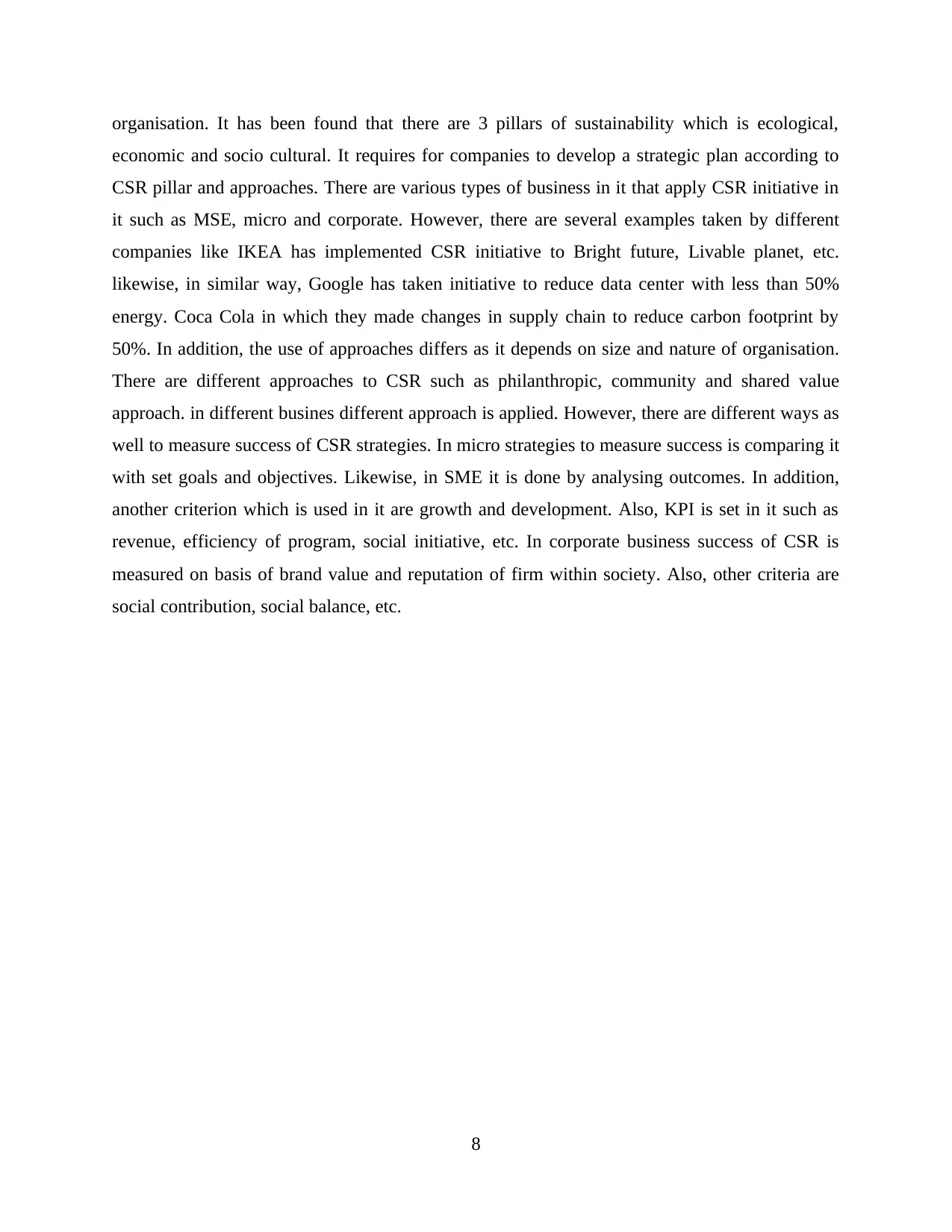
organisation. It has been found that there are 3 pillars of sustainability which is ecological,
economic and socio cultural. It requires for companies to develop a strategic plan according to
CSR pillar and approaches. There are various types of business in it that apply CSR initiative in
it such as MSE, micro and corporate. However, there are several examples taken by different
companies like IKEA has implemented CSR initiative to Bright future, Livable planet, etc.
likewise, in similar way, Google has taken initiative to reduce data center with less than 50%
energy. Coca Cola in which they made changes in supply chain to reduce carbon footprint by
50%. In addition, the use of approaches differs as it depends on size and nature of organisation.
There are different approaches to CSR such as philanthropic, community and shared value
approach. in different busines different approach is applied. However, there are different ways as
well to measure success of CSR strategies. In micro strategies to measure success is comparing it
with set goals and objectives. Likewise, in SME it is done by analysing outcomes. In addition,
another criterion which is used in it are growth and development. Also, KPI is set in it such as
revenue, efficiency of program, social initiative, etc. In corporate business success of CSR is
measured on basis of brand value and reputation of firm within society. Also, other criteria are
social contribution, social balance, etc.
8
economic and socio cultural. It requires for companies to develop a strategic plan according to
CSR pillar and approaches. There are various types of business in it that apply CSR initiative in
it such as MSE, micro and corporate. However, there are several examples taken by different
companies like IKEA has implemented CSR initiative to Bright future, Livable planet, etc.
likewise, in similar way, Google has taken initiative to reduce data center with less than 50%
energy. Coca Cola in which they made changes in supply chain to reduce carbon footprint by
50%. In addition, the use of approaches differs as it depends on size and nature of organisation.
There are different approaches to CSR such as philanthropic, community and shared value
approach. in different busines different approach is applied. However, there are different ways as
well to measure success of CSR strategies. In micro strategies to measure success is comparing it
with set goals and objectives. Likewise, in SME it is done by analysing outcomes. In addition,
another criterion which is used in it are growth and development. Also, KPI is set in it such as
revenue, efficiency of program, social initiative, etc. In corporate business success of CSR is
measured on basis of brand value and reputation of firm within society. Also, other criteria are
social contribution, social balance, etc.
8
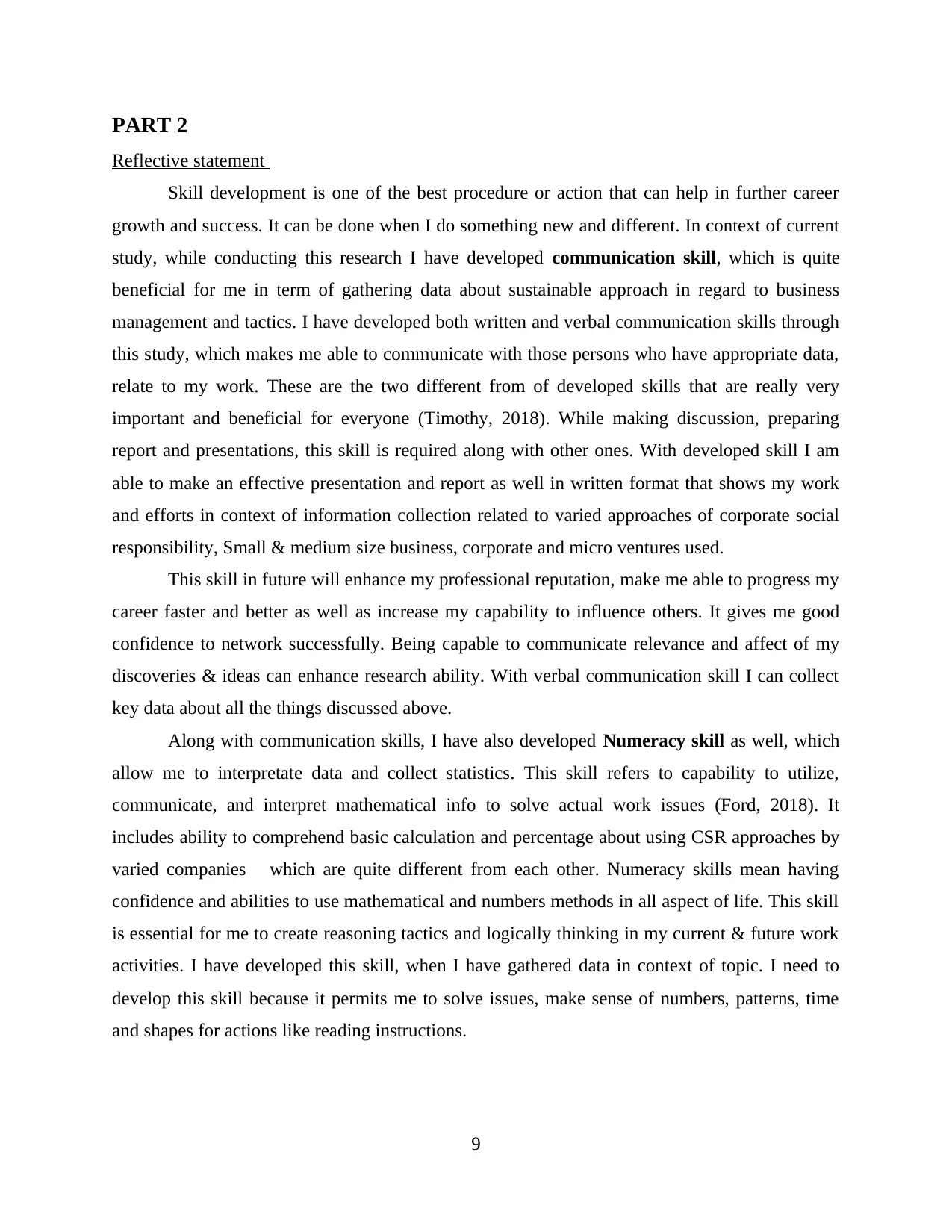
PART 2
Reflective statement
Skill development is one of the best procedure or action that can help in further career
growth and success. It can be done when I do something new and different. In context of current
study, while conducting this research I have developed communication skill, which is quite
beneficial for me in term of gathering data about sustainable approach in regard to business
management and tactics. I have developed both written and verbal communication skills through
this study, which makes me able to communicate with those persons who have appropriate data,
relate to my work. These are the two different from of developed skills that are really very
important and beneficial for everyone (Timothy, 2018). While making discussion, preparing
report and presentations, this skill is required along with other ones. With developed skill I am
able to make an effective presentation and report as well in written format that shows my work
and efforts in context of information collection related to varied approaches of corporate social
responsibility, Small & medium size business, corporate and micro ventures used.
This skill in future will enhance my professional reputation, make me able to progress my
career faster and better as well as increase my capability to influence others. It gives me good
confidence to network successfully. Being capable to communicate relevance and affect of my
discoveries & ideas can enhance research ability. With verbal communication skill I can collect
key data about all the things discussed above.
Along with communication skills, I have also developed Numeracy skill as well, which
allow me to interpretate data and collect statistics. This skill refers to capability to utilize,
communicate, and interpret mathematical info to solve actual work issues (Ford, 2018). It
includes ability to comprehend basic calculation and percentage about using CSR approaches by
varied companies which are quite different from each other. Numeracy skills mean having
confidence and abilities to use mathematical and numbers methods in all aspect of life. This skill
is essential for me to create reasoning tactics and logically thinking in my current & future work
activities. I have developed this skill, when I have gathered data in context of topic. I need to
develop this skill because it permits me to solve issues, make sense of numbers, patterns, time
and shapes for actions like reading instructions.
9
Reflective statement
Skill development is one of the best procedure or action that can help in further career
growth and success. It can be done when I do something new and different. In context of current
study, while conducting this research I have developed communication skill, which is quite
beneficial for me in term of gathering data about sustainable approach in regard to business
management and tactics. I have developed both written and verbal communication skills through
this study, which makes me able to communicate with those persons who have appropriate data,
relate to my work. These are the two different from of developed skills that are really very
important and beneficial for everyone (Timothy, 2018). While making discussion, preparing
report and presentations, this skill is required along with other ones. With developed skill I am
able to make an effective presentation and report as well in written format that shows my work
and efforts in context of information collection related to varied approaches of corporate social
responsibility, Small & medium size business, corporate and micro ventures used.
This skill in future will enhance my professional reputation, make me able to progress my
career faster and better as well as increase my capability to influence others. It gives me good
confidence to network successfully. Being capable to communicate relevance and affect of my
discoveries & ideas can enhance research ability. With verbal communication skill I can collect
key data about all the things discussed above.
Along with communication skills, I have also developed Numeracy skill as well, which
allow me to interpretate data and collect statistics. This skill refers to capability to utilize,
communicate, and interpret mathematical info to solve actual work issues (Ford, 2018). It
includes ability to comprehend basic calculation and percentage about using CSR approaches by
varied companies which are quite different from each other. Numeracy skills mean having
confidence and abilities to use mathematical and numbers methods in all aspect of life. This skill
is essential for me to create reasoning tactics and logically thinking in my current & future work
activities. I have developed this skill, when I have gathered data in context of topic. I need to
develop this skill because it permits me to solve issues, make sense of numbers, patterns, time
and shapes for actions like reading instructions.
9
⊘ This is a preview!⊘
Do you want full access?
Subscribe today to unlock all pages.

Trusted by 1+ million students worldwide
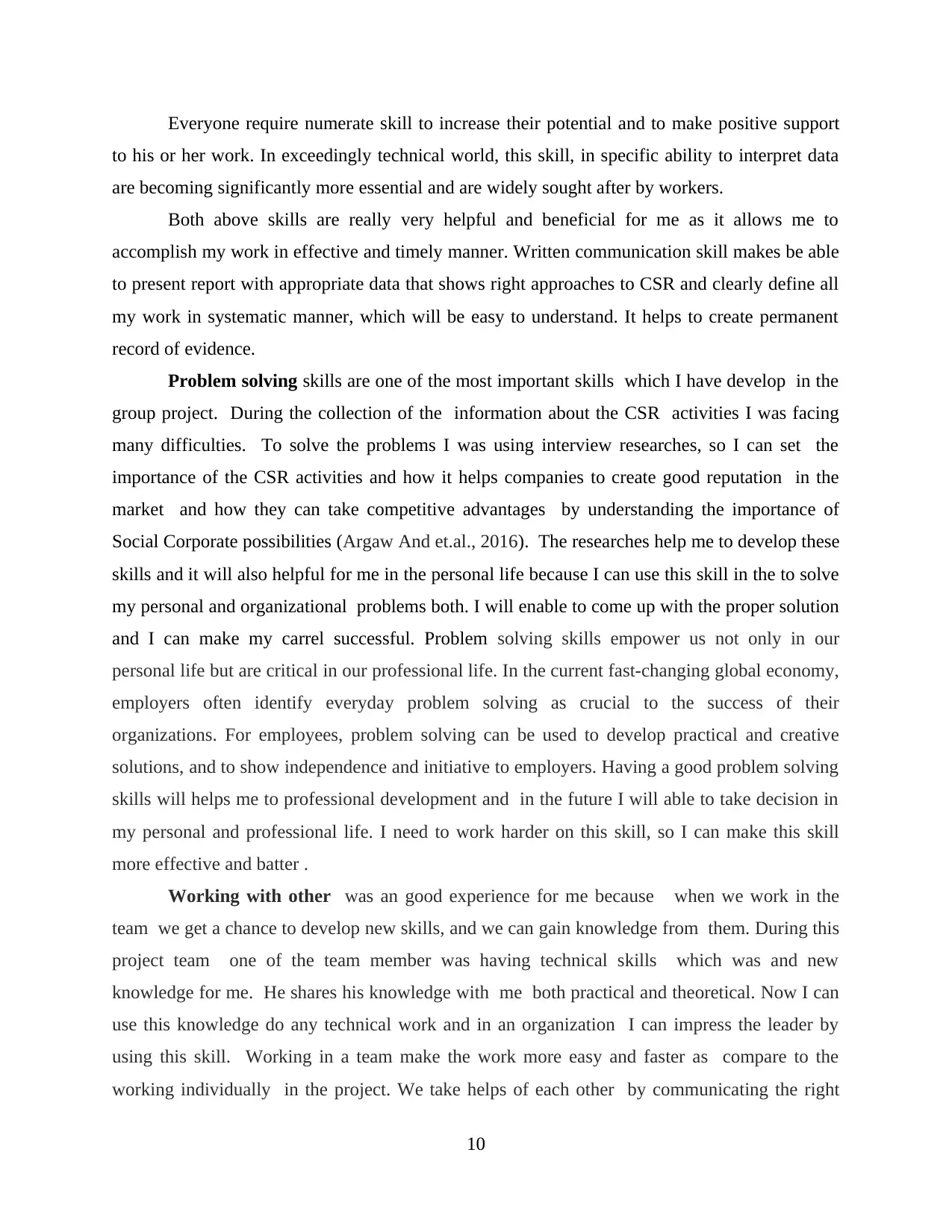
Everyone require numerate skill to increase their potential and to make positive support
to his or her work. In exceedingly technical world, this skill, in specific ability to interpret data
are becoming significantly more essential and are widely sought after by workers.
Both above skills are really very helpful and beneficial for me as it allows me to
accomplish my work in effective and timely manner. Written communication skill makes be able
to present report with appropriate data that shows right approaches to CSR and clearly define all
my work in systematic manner, which will be easy to understand. It helps to create permanent
record of evidence.
Problem solving skills are one of the most important skills which I have develop in the
group project. During the collection of the information about the CSR activities I was facing
many difficulties. To solve the problems I was using interview researches, so I can set the
importance of the CSR activities and how it helps companies to create good reputation in the
market and how they can take competitive advantages by understanding the importance of
Social Corporate possibilities (Argaw And et.al., 2016). The researches help me to develop these
skills and it will also helpful for me in the personal life because I can use this skill in the to solve
my personal and organizational problems both. I will enable to come up with the proper solution
and I can make my carrel successful. Problem solving skills empower us not only in our
personal life but are critical in our professional life. In the current fast-changing global economy,
employers often identify everyday problem solving as crucial to the success of their
organizations. For employees, problem solving can be used to develop practical and creative
solutions, and to show independence and initiative to employers. Having a good problem solving
skills will helps me to professional development and in the future I will able to take decision in
my personal and professional life. I need to work harder on this skill, so I can make this skill
more effective and batter .
Working with other was an good experience for me because when we work in the
team we get a chance to develop new skills, and we can gain knowledge from them. During this
project team one of the team member was having technical skills which was and new
knowledge for me. He shares his knowledge with me both practical and theoretical. Now I can
use this knowledge do any technical work and in an organization I can impress the leader by
using this skill. Working in a team make the work more easy and faster as compare to the
working individually in the project. We take helps of each other by communicating the right
10
to his or her work. In exceedingly technical world, this skill, in specific ability to interpret data
are becoming significantly more essential and are widely sought after by workers.
Both above skills are really very helpful and beneficial for me as it allows me to
accomplish my work in effective and timely manner. Written communication skill makes be able
to present report with appropriate data that shows right approaches to CSR and clearly define all
my work in systematic manner, which will be easy to understand. It helps to create permanent
record of evidence.
Problem solving skills are one of the most important skills which I have develop in the
group project. During the collection of the information about the CSR activities I was facing
many difficulties. To solve the problems I was using interview researches, so I can set the
importance of the CSR activities and how it helps companies to create good reputation in the
market and how they can take competitive advantages by understanding the importance of
Social Corporate possibilities (Argaw And et.al., 2016). The researches help me to develop these
skills and it will also helpful for me in the personal life because I can use this skill in the to solve
my personal and organizational problems both. I will enable to come up with the proper solution
and I can make my carrel successful. Problem solving skills empower us not only in our
personal life but are critical in our professional life. In the current fast-changing global economy,
employers often identify everyday problem solving as crucial to the success of their
organizations. For employees, problem solving can be used to develop practical and creative
solutions, and to show independence and initiative to employers. Having a good problem solving
skills will helps me to professional development and in the future I will able to take decision in
my personal and professional life. I need to work harder on this skill, so I can make this skill
more effective and batter .
Working with other was an good experience for me because when we work in the
team we get a chance to develop new skills, and we can gain knowledge from them. During this
project team one of the team member was having technical skills which was and new
knowledge for me. He shares his knowledge with me both practical and theoretical. Now I can
use this knowledge do any technical work and in an organization I can impress the leader by
using this skill. Working in a team make the work more easy and faster as compare to the
working individually in the project. We take helps of each other by communicating the right
10
Paraphrase This Document
Need a fresh take? Get an instant paraphrase of this document with our AI Paraphraser
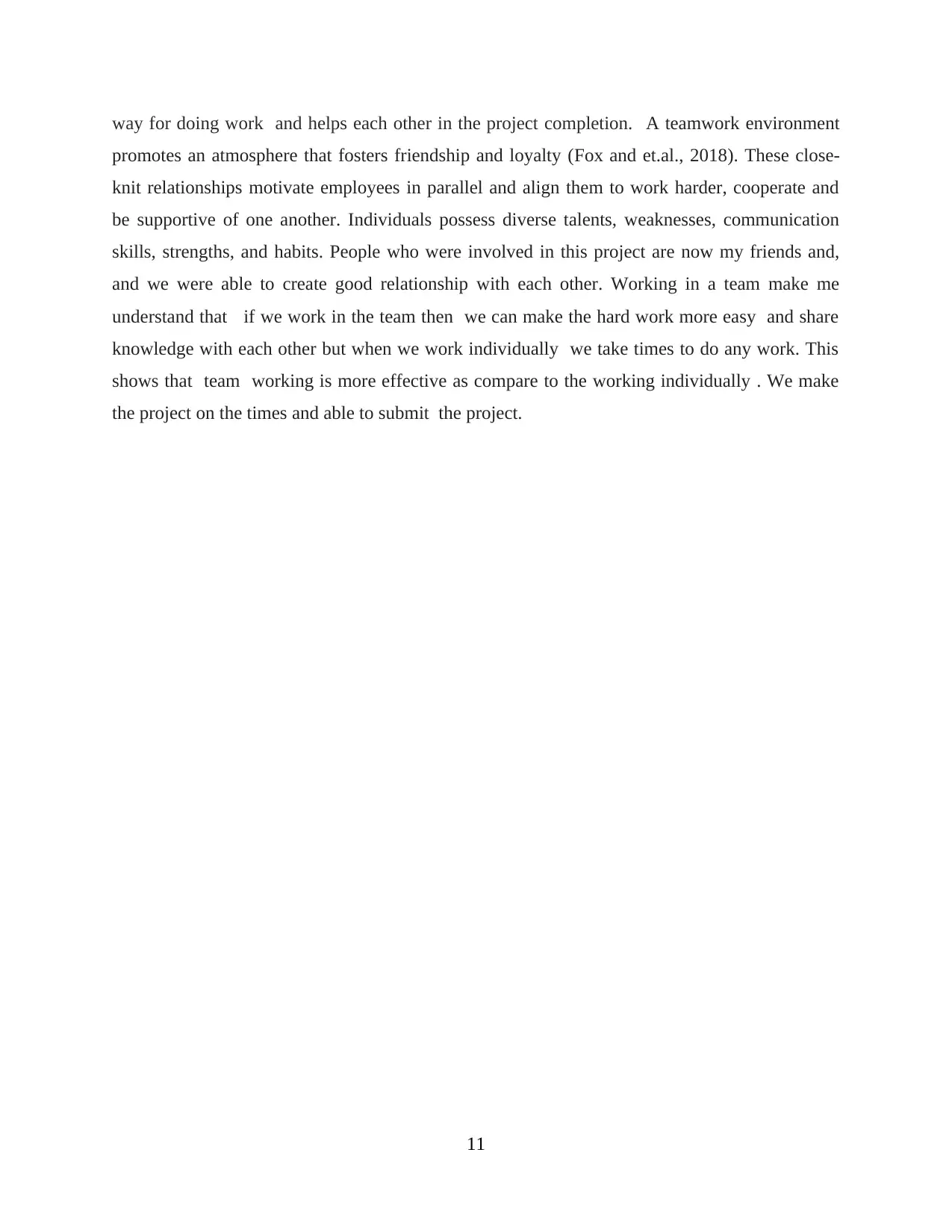
way for doing work and helps each other in the project completion. A teamwork environment
promotes an atmosphere that fosters friendship and loyalty (Fox and et.al., 2018). These close-
knit relationships motivate employees in parallel and align them to work harder, cooperate and
be supportive of one another. Individuals possess diverse talents, weaknesses, communication
skills, strengths, and habits. People who were involved in this project are now my friends and,
and we were able to create good relationship with each other. Working in a team make me
understand that if we work in the team then we can make the hard work more easy and share
knowledge with each other but when we work individually we take times to do any work. This
shows that team working is more effective as compare to the working individually . We make
the project on the times and able to submit the project.
11
promotes an atmosphere that fosters friendship and loyalty (Fox and et.al., 2018). These close-
knit relationships motivate employees in parallel and align them to work harder, cooperate and
be supportive of one another. Individuals possess diverse talents, weaknesses, communication
skills, strengths, and habits. People who were involved in this project are now my friends and,
and we were able to create good relationship with each other. Working in a team make me
understand that if we work in the team then we can make the hard work more easy and share
knowledge with each other but when we work individually we take times to do any work. This
shows that team working is more effective as compare to the working individually . We make
the project on the times and able to submit the project.
11

12
⊘ This is a preview!⊘
Do you want full access?
Subscribe today to unlock all pages.

Trusted by 1+ million students worldwide
1 out of 14
Related Documents
Your All-in-One AI-Powered Toolkit for Academic Success.
+13062052269
info@desklib.com
Available 24*7 on WhatsApp / Email
![[object Object]](/_next/static/media/star-bottom.7253800d.svg)
Unlock your academic potential
Copyright © 2020–2025 A2Z Services. All Rights Reserved. Developed and managed by ZUCOL.





